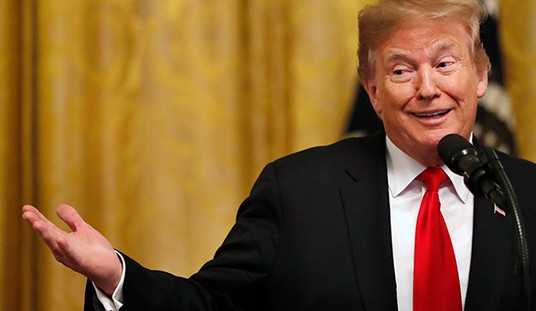In just a year on the job, Washington, D.C.’s schools chancellor, Michelle Rhee, has already made more waves in the nation’s worst school system than all her predecessors combined. In doing so, she’s had to stand up to some of the city’s most powerful and vicious people — and in D.C. that is saying something.
Now, when most people in her shoes would be pulling back or at least holding steady, she’s doubling down. She’s going after the biggest of all the structural problems within the government school system: the poisonous system of teacher pay.
Looks like “tough young women who are new on the job but aren’t afraid to take on powerful, corrupt interests” is going to be the theme of the month in D.C.
For decades, the D.C. school system has been a union boss’s dream and a parent’s nightmare. Across the country, the government school system is shot through with featherbedding, rewards for mediocrity, and absolute job protection for even the worst teachers, all courtesy of your friendly neighborhood teachers’ union. But in most places these negative influences are counterbalanced by positive influences — for example, mayors, governors and (sometimes) even voters can pressure school boards for reform. In D.C., though, the whole civic system is so dysfunctional that for a very long time these positive influences were blocked from having much impact. So the system became by far the nation’s worst — loaded down with teachers and administrators who were there because of political patronage, and indifferent to how many children’s lives it was destroying.
Those days are gone now, and they’re never coming back. The system got so bad that support for reform reached a critical mass capable of breaking through the union stranglehold. By the turn of the 21st century, everyone with a stake in D.C.’s success, which ultimately means the whole country, was ready to back reform.
Progress has been made on a lot of fronts: vouchers, charters, closing surplus schools, trimming bureaucracy — you name it. Even the city teachers’ union now has a president, George Parker, who acknowledges problems and has made reasonable compromises with reformers.
To see how much has changed, just consider the amazing fact that about one out of every three public-school students in D.C. attends a charter school — government-owned but non-unionized, privately operated, and (most important of all) chosen by parents — instead of a regular public school. “We lost 6,000 students last year,” says Parker, referring to the number of students who moved from regular schools to charters. Six thousand students is over 13% of the city’s remaining enrollment in regular public schools — in one year.
Rhee isn’t the force behind charter schools or vouchers in D.C. She’s in charge of the regular public system. But the same widespread mandate for reform that made charters and vouchers successful have allowed Rhee to succeed with reforms like closing schools that were only there to create patronage jobs, introducing curriculum innovation, and taking on the unbelievable amount of bureaucratic waste in the system. And as vouchers and charters have sent a message that the system can’t take students for granted any more, the pressure for reform has only increased — strengthening Rhee’s hand.
Now, Rhee is taking a stab at the big prize. She wants to offer teachers the option of higher pay — as much as $20,000 extra, pushing some salaries well over $100,000 — if they give up their absolute job protections and their seniority-based pay scale. And she’s holding out to get it; labor negotiations over the city’s teacher contract have stalled over this issue.
Of all the reforms that could be made within the government school system, changing the structure of teacher pay has the biggest potential to dramatically improve the system. (Vouchers have even more potential to improve government schools, as their track record consistently shows. But that’s reform from outside the system, not inside it.)
There’s a strong consensus in the empirical research that teacher quality makes a huge difference. And it’s pretty generally conceded — even among left-leaning education wonks, although not, obviously, by the teachers’ unions — that our current teacher workforce is pretty low in quality. Our society recruits teachers decidedly from the lower end of the academic spectrum (see here for the gory details, if you can stand them.)
Why does the system attract low-performing teachers and repel high-performing ones? It’s primarily because the teacher salary system is designed to ensure this result.
Teacher pay is based almost entirely on two factors: years of experience and the possession of teaching certificates and credentials. A large body of empirical evidence establishes that neither of these has much relationship to actual teacher quality.
Teacher pay bears no effective connection to teacher performance. Meanwhile, in all the other professions, high performers are paid better and low performers are paid worse.
Think about what that means for people who are deciding whether to become teachers. Those who would make great teachers will consistently be paid better in any other profession besides teaching, while those who would make bad teachers will consistently be paid better as teachers than in any other profession.
Obviously some high performers go into teaching anyway. But they’re small in terms of percentages. The financial incentive can’t help but reduce the quality of the labor pool.
Defenders of the status quo have tried to argue that it was the expansion of opportunities for women in other professions that drove down teacher quality. And that makes a plausible story. However, it doesn’t seem to square with the facts. A Harvard economist ran the numbers historically for the past half-century or so, and found that the decline in teacher quality didn’t track with the rise of opportunities for women in other professions. It did, however, track closely with the unionization of the teaching profession — which is another way of saying that it tracked with the imposition of the current pay system.
There are few issues more important than teacher quality, and there is no serious way of improving teacher quality very much until we deal with the pay system. It’s that simple.
Unfortunately, the unions have managed to block serious experiments with merit pay. In the few cases where something called “merit pay” gets through the political wringer, it’s loaded down with so many compromises that it doesn’t amount to real reform. That’s why we don’t have much empirical evidence on how merit pay affects teaching.
And I’m afraid Rhee’s proposal is falling afoul of the same problem. Most important, her proposed system would be voluntary — and of course the teachers who really need to be subject to it won’t sign up. The removal of tenure protections won’t make much difference in a voluntary program; the teachers who need to get fired aren’t going to volunteer. And the removal of the seniority-based pay system will have a limited effect if it’s only applied to teachers who choose it.
Nonetheless, the proposal is still a significant break from the status quo. For all its limitations, it wouldn’t be merely a “symbolic” program — if Rhee wins her struggle with the unions, D.C. will have one of the most serious experiments in merit pay ever attempted. Yet the symbolic power of showing that the unions can be beaten on this issue might well be the single most major impact the program would have.









Join the conversation as a VIP Member